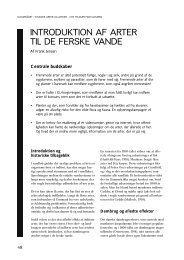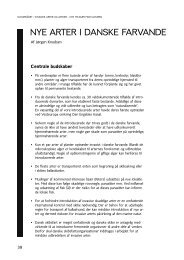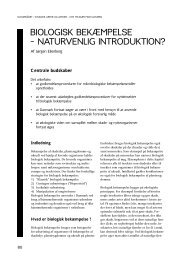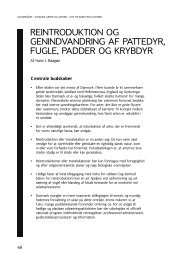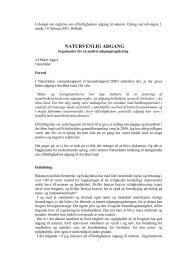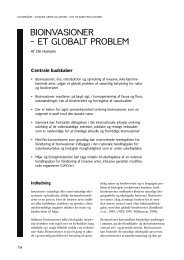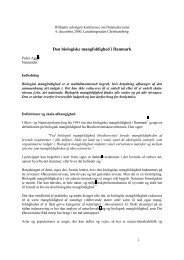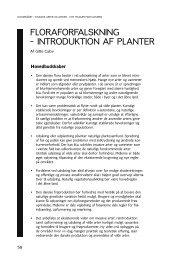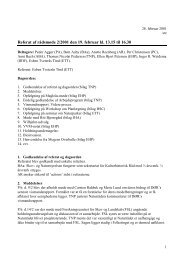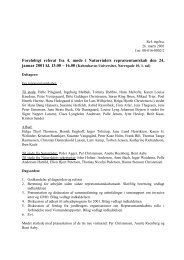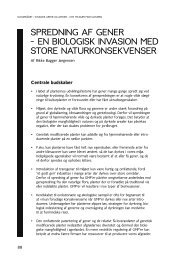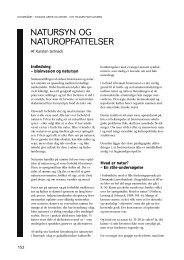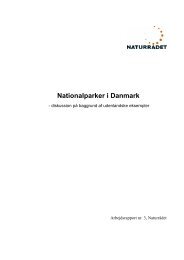Læs hele rapporten som pdf-fil. - Naturrådet
Læs hele rapporten som pdf-fil. - Naturrådet
Læs hele rapporten som pdf-fil. - Naturrådet
Create successful ePaper yourself
Turn your PDF publications into a flip-book with our unique Google optimized e-Paper software.
NATURRÅDET / TEMARAPPORT / NATUR OG LANDBRUG<br />
74<br />
The WTO context<br />
In this context it is important to keep in mind that<br />
by the end of this year a new round of international<br />
trade negotiations will be launched by the<br />
World Trade Organisation (WTO). Here, too,<br />
agricultural support mechanisms will come under<br />
review. The WTO distinguishes three different<br />
types of agricultural support:<br />
“Amber Box”: Including traditional measures of<br />
market and price support, which had to be reduced<br />
already under the present agreement. Here,<br />
further reductions will be required.<br />
“Blue Box”: In particular farm income compensation<br />
payments for agricultural policy reforms.<br />
Under the present agreement they are protected<br />
by a peace clause until 2003. Yet, they will be the<br />
main target for future reductions.<br />
“ G r een Box”: Includes measures that are fully<br />
decoupled and thus legitimised as permanent<br />
support mechanisms. They cover in particular<br />
a g r i - e nvironmental incentives and regionally targeted<br />
measures, such as support for areas facing<br />
specific handicaps.<br />
Shifting priorities<br />
If the EU agricultural budget is considered in this<br />
p e r s p e c t ive, significant changes can be observed<br />
having taken place over the last decade. Today, the<br />
c h a l l e n ge of Agenda 2000 is to launch yet another<br />
shift (Buckwell & Sotte 1997). In 1990, the<br />
greatest share of EU-agricultural expenditure wa s<br />
devoted to the regulation of agricultural markets<br />
and prices. Funds were used to finance intervention<br />
costs, stocking of surpluses, subsidies fo r<br />
export dumping. With the ‘92 reform a decoupling<br />
of price and income support has been achieved.<br />
Expenditure for market and price policies<br />
(amber box) were reduced and replaced by direct<br />
payments compensating for the income effects of<br />
the price cuts (blue box). In parallel, also other<br />
direct payments increased in importance, although<br />
at a much slower rate: The compensation<br />
payments for natural handicaps in less favoured<br />
and mountain areas (LFA), and the remunerations<br />
for positive environmental services provided<br />
by farmers under the agri-environmental regulation<br />
2078/92 (green box). Finally, also the funding<br />
for rural development measures gained in<br />
importance, encompassing farm investment aid<br />
as well as measures supporting rural infrastructure<br />
improvement, and more broadly for the creation<br />
of new economic opportunities in rural<br />
areas, reaching beyond the agricultural sector<br />
(Figure 8).<br />
The next steps<br />
With Agenda 2000 this tendency should continue,<br />
but only in the short term: The costs of<br />
market and price policy should be further reduced,<br />
while compensation for price cuts will<br />
increase initially. In the longer term, however,<br />
these compensation payments will have to be<br />
reduced, not only due to WTO pressure on blue<br />
box payments, but also because their legitimation<br />
is fading away. It is thus crucial that with Age n d a<br />
2000 new options are established to gradually<br />
shift future CAP expenditure towards green box<br />
compatible measures that can be defended both<br />
internally and internationally. In the present<br />
Agenda 2000 debate, many agricultural ministers,<br />
often impressed by the protests of traditional<br />
farm lobbies, are reluctant to prepare for such<br />
options. There is strong resistance to any attempt<br />
of broadening the sectoral focus of agricultural<br />
policy towards a more integrated rural development<br />
perspective, taking on board agri-environmental<br />
and nature conservation concerns. In<br />
particular, the Commission proposals to finance<br />
such measures from the G u a r a n t ee section of<br />
the European agricultural fund are strongly criticised.<br />
Here the Commission should be backed up<br />
by politicians and NGOs caring for env i r o n m e ntal<br />
and nature conservation concerns. If this is not<br />
achieved, there is a great risk that the means for<br />
promoting sustainable rural development will<br />
be lost entirely. We would all be losers, not only<br />
farmers, but rural Europe in general, its people, its<br />
landscapes, our common cultural and natural<br />
heritage.



